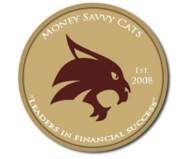US Money and Banking
US Currency
US currency is based on a decimal system, with one dollar ($1 or $1.00) equal to one hundred cents. Coin currency is used for amounts less than one dollar. Below are the common coins and their equivalencies:
- Penny equals one cent or 0.01 dollars
- Nickel equals five cents or 0.05 dollars
- Dime equals ten cents or 0.10 dollars
- Quarter equals twenty-five cents or 0.25 dollars
Financial Education Resources:

Savvy Cats
Financial information can be a bit overwhelming but Money Savvy Cats is here to help!
Banking:
Within the first few days of your arrival to the US, you will want to open an account at a local bank. This will allow for an easy transfer of funds and access to a checking account, and credit and debit cards.
To open a bank account, you will need to bring along:
- Passport
- Visa
- Form I-20
- Student ID
- Letter of enrollment from your university
- An amount of money to deposit into the account (this will vary between banks)
These requirements may be slightly different across banks, so make sure you check what your bank requires before heading over. You should not need a Social Security number to open a bank account.
Credit and Debit Cards
Debit Cards - This allows you to pay for goods and services directly from your bank account, reducing the need for cash. You can request a debit card when you open your checking or savings account or later if you decide you would like one.
Credit Cards - Requirements for obtaining a credit card and interest rates charged on unpaid balances vary among banks. Be sure to check with your bank.
When applying for a credit card, be sure to read all the details (terms and conditions) of the credit card offer before committing to it. Make sure that you know the structure of the credit card company’s annual fees, such as how much and when they charge it to your card.
Wire Transfer
To transfer money into your bank account, you should contact the bank to discuss wire transfer options. Below are several items to consider during the process:
- Wire transfer fees
- Available support
- Minimum and maximum wire transfer amounts
- Country restrictions
- Exchange rates
- Ratings and security qualifications
- Transfer speed
Review instructions on how to make payment by international wire transfer from your home country's bank to Texas State University.
Please contact the Student Business Services on questions related to tuition and fee.
Banking Options:
Banks all over the US have varying services available. There are several banks located in San Marcos. Be sure to visit their websites for information about fees, additional locations, and convenient ATMs.
Questions to ask when choosing a bank:
- What identification and documents do I need to open an account?
- How much money is required to open each type of account?
- What kind of checking, savings, or money market accounts does the bank offer?
- What fees do they charge?
- How much interest does this type of account earn?
- Does the bank have ATMs that are near to your campus/ home?
On-Campus Bank:

Location: LBJ Student Center - Room 2-8.1
Contact: 512-214-6123
Wells-Fargo-Documents-To-Open-a-Bank-Account.pdf